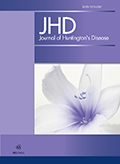Authors: Schuldenzucker, Verena | Schubert, Robin | Muratori, Lisa M. | Freisfeld, Frauke | Rieke, Lorena | Matheis, Tamara | Schramke, Sarah | Motlik, Jan | Kemper, Nicole | Radespiel, Ute | Reilmann, Ralf
Article Type:
Research Article
Abstract:
Background: Huntington’s disease (HD) is an autosomal-dominant, progressive neurodegenerative disorder with motor, cognitive, behavioral and metabolic symptoms. HD patients exhibit an altered response to stress which is reflected in changes of cortisol levels. Large animal models of HD such as the Libechov minipig are currently explored in preclinical studies to improve translational reliability and assessing behavior is of interest. Objective: This study aimed to investigate whether cortisol metabolism and response to stress are changed in minipigs transgenic for the Huntington gene (tgHD) compared to wildtype (wt) animals suggesting that cortisol may be used as a marker for stress
…in minipigs. Methods: Thirty-two Libechov minipigs (14 tgHD and 18 wt) were tested before, during and after a stressor, i.e., a hoof trimming procedure, was applied at baseline and after one year. A total of six saliva samples were collected at each assessment and cortisol was measured. In addition, body temperature and respiratory rate were assessed at three pre-determined points during each hoof trimming procedure. Results: All minipigs showed a rise of cortisol in response to the hoof trimming stressor similarly to cortisol changes induced by stress observed in humans. No relevant differences were detected between tgHD and wt minipigs. Conclusion: Cortisol testing for the assessment of stress compensation, e.g., during hoof trimming, is feasible and well tolerated in wt and tgHD minipigs. To elucidate the time profile of cortisol responses to stressors further studies with assessments at multiple time points and exploration of the diurnal profiles of cortisol in minipigs are recommended.
Show more
Keywords: Animal models, minipigs, phenotyping, biomarker, saliva, cortisol, vital signs
DOI: 10.3233/JHD-180285
Citation: Journal of Huntington's Disease,
vol. 7, no. 2, pp. 151-161, 2018
Price: EUR 27.50





